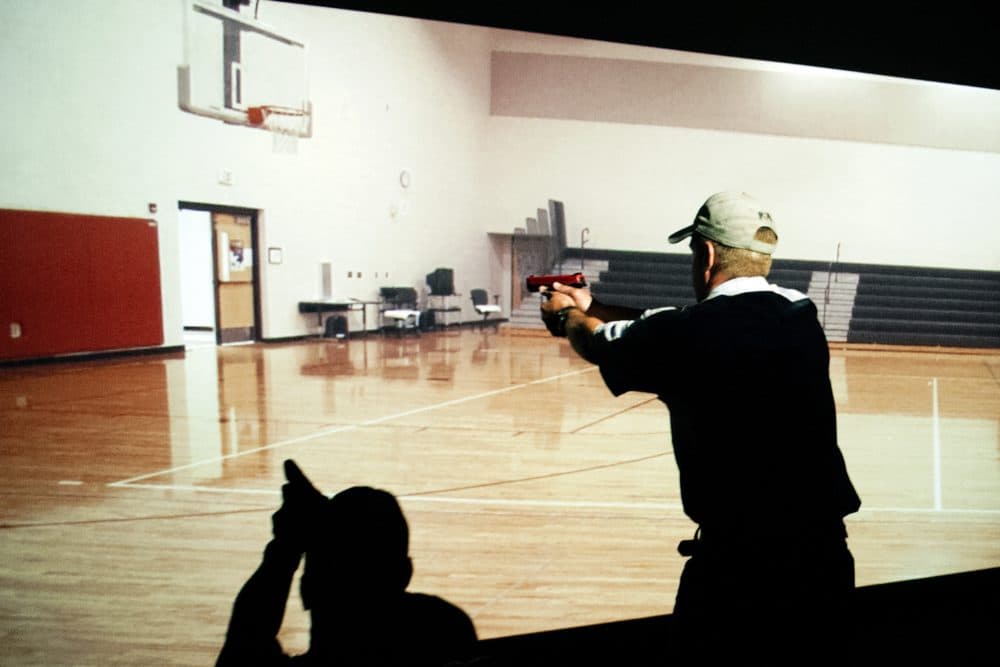Advertisement
Major Teachers Unions Call On Schools To Rethink Active Shooter Drills

Two major teachers unions have called on schools to rethink lockdown drills — the active shooter training scenarios that some educators and psychologists say can traumatize children with little proof that they actually work.
The American Federation of Teachers and the National Education Association, the country’s largest education unions, released a report Tuesday saying they do not recommend active shooter training for students. The unions put out the release jointly with the advocacy group Everytown for Gun Safety.
“We want to keep our kids safe,” says Lily Eskelsen García, president of the National Education Association. But she says lockdown drills aren’t the way to do that.
“Folks are desperate to do something,” she says. “And what happens when you’re not sure what that something is, is you just make stuff up.”
The National Center for Education Statistics reports 95% of American public schools conduct those drills regularly. And stakeholders in the school security industry have said that active shooter drills are an important part of violence prevention.
The release from the unions offers guidelines for schools that continue to run drills, many of which are required to do so by a patchwork of state laws: Give students a warning well ahead of time, use age-appropriate material and avoid hyper-realistic simulations that mimic an actual shooting.
Interview Highlights
On why she thinks running lockdown drills can do more harm than good
“What [schools] have said is, 'Hey, we do fire drills, let's do active shooter drills. What could go wrong?' If you talk to the National Association of School Psychologists, they will tell you these drills can cause trauma. They can trigger a psychological reaction that scares kids for a long, long time. It's not a fire drill. You're saying, 'Someone is in our school and they're shooting up the school and they come in and shoot you and so run and hide.' And it really is something we have to rethink. Is it causing more trauma and stress in these kids than actually keeping them safe?"
On the rarity of school shooting events
“About 150 tragedies of people [dying] in public schools [have happened] since Columbine. That's for the last 20 years. 150 tragedies. The chances of winning the lottery are better than an active shooter in your school. So schools are still very safe places.”
On alternatives to student active shooter drills
“What you want to do is to have the professionals, the educators in that building, prepared. You do not have to traumatize kids. The adults in the school can be trained in how to have a lockdown. And that's what we believe should be happening.”
On what schools should do if they are planning to run lockdown drills
“If you’re going to have any kind of drill, and that includes with the adults, by the way, you announce it in advance. The school psychologists, the folks that are the mental health providers actually have some good advice for us. You announce the drills in advance. You do not scare people. You do not frighten them. I taught sixth grade for 20 years. I was never frightened in a fire drill ... They had trained me in advance what to do and how to get the kids out of the building. I knew that a fire drill was going to happen that day so that I was prepared. You shouldn't do anything different if it's a lockdown situation. And you also want to work with parents ... you want to have them understand that the teachers are prepared.”
On solutions to gun violence in schools
“What we need to do is prevention. And that means that you start today, you start [with] the counselors, the school psychologists... you are identifying if there are students who may need special help. Some of the tragedies, starting with Columbine, were [carried out by] the students in that school themselves. What are we doing to make sure that our kids know that if they have stress, they have mental health issues, that there's someone on-site there to take care of them? And I can't say this enough: We need to do something to keep very dangerous weapons from being easily accessible to potentially dangerous people.”
Francesca Paris produced and edited this interview for broadcast with Todd Mundt. Paris also adapted it for the web.
This segment aired on February 11, 2020.
